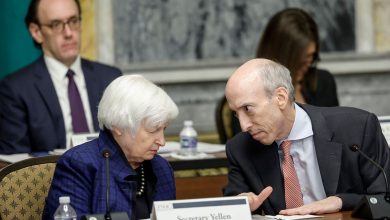Banking sector’s growing political might could blunt reform, experts warn

[ad_1]
Lawmakers and regulators in Washington are hard at work devising strategies to prevent another bank bailout following the failures last month of Silicon Valley Bank and Signature Bank of New York.
Congress is debating several ideas, including lifting or eliminating the $250,000 cap on federal deposit insurance, coupled with higher deposit-insurance fees and stricter rules around how banks fund themselves.
A panel of experts and former regulators organized by the Brookings Institution Wednesday mostly took a dim view of eliminating deposit-insurance caps, however, given the banking industry’s history of convincing government watchdogs to ease regulations while maintaining public subsidies that enrich bank shareholders and executives.
“Unlimited deposit insurance would require even stricter and fully consistent financial regulation. We have a real history that our political system is incapabable of that,” Patricia McCoy, a former Obama Treasury official, said at the Brookings event. “The lack of political will has grown worse with the growing political might of banks, and banks are already pushing back against tighter regulation.”
Calls to lift or eliminate the Federal Deposit Insurance Corp.’s $250,000 cap grew in the days following Silicon Valley Bank’s collapse, after federal regulators used a systemic-risk exception in the law to backstop even uninsured deposits at the bank.
Read more: Unlimited deposit insurance: A radical idea that’s gaining steam in Congress
The move underscored complaints that the U.S. already has a system of unlimited, but implicit, deposit insurance that is not sufficiently paid for up front by the banking system, leaving the remainder of the bill to be footed by taxpayers.
Few thought the failure of a midsize regional bank posed a risk to the entire U.S. economy until last month, and it would be reasonable to expect that regulators in the future may lean on the systemic-risk exception in the law to once again justify bailouts, Berkeley Law professor Prasad Krishnamurthy said during the event.
In theory, explicit unlimited deposit insurance would prevent bank runs like that on Silicon Valley Bank and could be paid for with risk-based fees on banks themselves.
Peter Conti-Brown, who teaches financial regulation at Wharton, argued instead for creating a second tier of deposit insurance of up to $2 million for small businesses, which he said often don’t have the resources for sophisticated corporate treasury management. He added that a $250,000 transaction account is insufficient even for small businesses.
This proposal dovetails with concerns voiced by Sen. Elizabeth Warren, a Massachusetts Democrat, and Sen. Mitt Romney, a Utah Republican, in recent weeks.
“Small businesses need to be able to count on getting their money to make payroll, to pay the utility bills,” Warren told Face the Nation last month. “Nonprofits need to be able to do that.”
Conti-Brown said that bank regulators’ performance in the years leading up to Silicon Valley Bank’s failure and in the weeks following it should humble policy makers and caution against radical changes.
He said he suspects regulators overreacted to the March bank runs, but even if they reacted appropriately, that serves as evidence that there were more serious failures in the years leading up to the crisis.
“We need to remember March 2023 as a black mark, not only on the bankers who got this wrong,” he said, “but also on the central bankers and the government regulators” who failed to either supervise banks correctly or let them fail without resorting to a public bailout.
Regional bank stocks
KRE,
were trading lower Wednesday, underperforming the S&P 500
SPX,
[ad_2]
Source link



